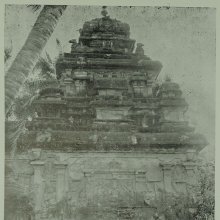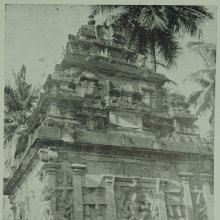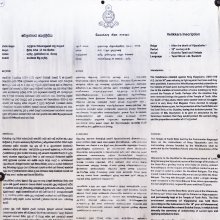Amara, Amarā, Amāra: 42 definitions
Introduction:
Amara means something in Buddhism, Pali, Hinduism, Sanskrit, Jainism, Prakrit, the history of ancient India, Marathi, Hindi, biology, Tamil. If you want to know the exact meaning, history, etymology or English translation of this term then check out the descriptions on this page. Add your comment or reference to a book if you want to contribute to this summary article.
Amara has 40 English definitions available.
Alternative spellings of this word include Amar.
Images (photo gallery)
Languages of India and abroad
Sanskrit dictionary
[Deutsch Wörterbuch]
Source: Cologne Digital Sanskrit Dictionaries: Böhtlingk and Roth Grosses Petersburger WörterbuchAmara (अमर):—(3. a + mara) [Pāṇini’s acht Bücher 6, 2, 116.]
1) adj. unsterblich, unvergänglich [The Śatapathabrāhmaṇa 14, 6, 8, 8. 7, 2, 30. 31.] [?= Bṛhadāranyakopaniṣad 4, 4, 25. Prooemium im Hitopadeśa 3.] f. ā [Manu’s Gesetzbuch 2, 148.] ī [Rāmāyaṇa 1, 34, 16.] —
2) m. a) Gott [Amarakoṣa 1, 1, 1, 2.] [Hemacandra’s Abhidhānacintāmaṇi 87.] [Anekārthasaṃgraha 3, 513.] [Medinīkoṣa r. 104.] [Manu’s Gesetzbuch 7, 72.] [Sundopasundopākhyāna 1, 22.] [Arjunasamāgama 4, 12.] [Hiḍimbavadha 2, 27.] [Nalopākhyāna 2, 23. 3, 3. u.s.w.] [Rāmāyaṇa 2, 1, 35.] [Viśvāmitra’s Kampf 10, 31.] — b) Nomen proprium eines Marut's [Harivaṃśa 11545.] — c) Euphorbia Tirucalli L., baumartig, [Hemacandra’s Anekārthasaṃgraha 3, 513.] [Medinīkoṣa r. 104] [?(Manu’s Gesetzbuch Nalopākhyāna). AINSLIE, Mat. ind. 2, 133. 425. Suśruta 2, 207, 15. 223, 15. 18.] — d) Tiaridium indicum Lehm., eine jährige Pflanze, eine der gemeinsten in Indien, [Hemacandra’s Anekārthasaṃgraha] [Medinīkoṣa] (m. n.). — e) Quecksilber [Rājanirghaṇṭa im Śabdakalpadruma] — f) Nomen proprium = amarasiṃha [Trikāṇḍaśeṣa 1, 1, 2. 3, 3, 1.] [Hemacandra’s Abhidhānacintāmaṇi 685,] [Scholiast] [Medinīkoṣa Anhang 2.] [Vopadeva’s Grammatik] in [Weber’s Verzeichniss No. 790.] — g) Name eines Berges [Mahābhārata 2, 1193.] [ Kunde des Morgenlandes 2, 30.] — h) myst. Bezeichnung des Buchstabens u [Weber’s Indische Studien 2, 316.] —
3) f. rā . a) Nabelschnur [Trikāṇḍaśeṣa 3, 3, 325]; vgl. amala 2,a. — b) Uterus [Medinīkoṣa r. 104.] — c) Hauspfosten [Hemacandra’s Anekārthasaṃgraha 3, 514.] [Medinīkoṣa] — d) Name verschiedener Pflanzen: Panicum dactylon (dūrvā) [Hemacandra’s Anekārthasaṃgraha] [Medinīkoṣa] Cocculus cordifolius DC. (guḍūcī) dies. und [Trikāṇḍaśeṣa 3, 3, 325.] indravāruṇīvṛkṣaḥ .. vaṭīvṛkṣaḥ .. mahānīlīvṛkṣaḥ .. gṛhakanyā . ghṛtakumārī . iti dharaṇā . [Rājanirghaṇṭa im Śabdakalpadruma] — e) Indra's Stadt (s. amarāvatī) [Hemacandra’s Anekārthasaṃgraha 3, 513.] [Medinīkoṣa r. 104.]
--- OR ---
Amara (अमर):—
3) vgl. folgende Stelle aus dem [RUDRA][YĀMALOTTARAKH. 56 im Śabdakalpadruma] u. pañcāmarāḥ. ekā tu amarā dūrvā tasyā granthiṃ samānayet . anyā tu vijayā devī siddhirūpā sarasvatī .. anyā tu villapatrasthā (sic) śivasaṃtoṣakāriṇī . anyā tu yogasiddhyarthe nirguṇḍī cāmarā latā .. anyā tu kālatulasī śrīviṣṇoḥ priyatoṣaṇī . etāḥ pañcāmarā jñeyā yogasādhanakarmāṇe ..
--- OR ---
Amarā (अमरा):—
3) b) vgl. aparā Uterus (richtiger Nachgeburt).
Source: Cologne Digital Sanskrit Dictionaries: Sanskrit-Wörterbuch in kürzerer FassungAmara (अमर):——
1) Adj. (f. ā und ī) unsterblich , unvergänglich. vat Adv. [162,5.] —
2) m. — a) ein Gott. — b) Bez. der Zahl 33 [Gaṇitādhāya 2,2.] — c) *Quecksilber. — d) Euphorbia_Tirucalli L. und *Tiaridium_indicum Lehm. — e) mystische Bez. des Lautes u — f) Nomen proprium — α) eines Marut. — β) = amarasiṃha. —
3) f. ā — a) *Nachgeburt. — b) *Nabelschnur. — c) *Hauspfosten. — d) *Panicum Dactylon , *Cocculus_cordifolius DC. , *Coloquinten-Gurke , *Aloe_perfoliate L. und indica Royle u.s.w. Nach dem [RUDRAYĀMALA.] : Dūrvā-Gras , Vitex Negundo L. , schwarzes Basilienkraut. — e) *Indra's. Stadt. —
4) *f. ī Sanseviera Roxburghiana [Rājan 3,7.]
--- OR ---
Amāra (अमार):—m. Nichttödtung [Rājataraṃgiṇī 5,64.119.]
--- OR ---
Āmara (आमर):—Adj. der Götter. āhar [Śrīpati ] in [Bhāskara’s Golādhyāya (Kern) 304.]
Sanskrit, also spelled संस्कृतम् (saṃskṛtam), is an ancient language of India commonly seen as the grandmother of the Indo-European language family (even English!). Closely allied with Prakrit and Pali, Sanskrit is more exhaustive in both grammar and terms and has the most extensive collection of literature in the world, greatly surpassing its sister-languages Greek and Latin.
See also (Relevant definitions)
Starts with (+248): Amara Amaradevi, Amara fuye, Amara kavi, Amara Sinha, Amara-balli, Amara-cilaikantakam, Amara-lota, Amara-magani, Amaraballi, Amarabharta, Amarabhartri, Amarabharttri, Amarabhuja, Amarabhushana, Amaracala, Amaracandra, Amaracandrika, Amaracarya, Amaracayam, Amarachandra.
Ends with (+289): Aaladamara, Acamara, Addamara, Adhamara, Aghamara, Aitamara, Ajamara, Ajaramara, Akamara, Akasatamara, Akasathamara, Akashatamara, Alamara, Albizia amara, Alli-tamara, Allit-tamara, Ambucamara, Ambuchamara, Anakamamara, Anamramara.
Full-text (+501): Amaravati, Amaramjaya, Amarapaga, Amarastri, Amaresha, Amaradaru, Amaram, Amaradvija, Amarakosha, Amarangana, Amaradhipa, Amarapushpika, Amaradri, Amarapushpa, Amaratatini, Amarejya, Amarammanya, Balukambi, Amaraprakhya, Amaraprabha.
Relevant text
Search found 80 books and stories containing Amara, Amarā, Amāra, A-mara, A-māra, A-marā, Āmara; (plurals include: Amaras, Amarās, Amāras, maras, māras, marās, Āmaras). You can also click to the full overview containing English textual excerpts. Below are direct links for the most relevant articles:
The Mahavastu (great story) (by J. J. Jones)
The Skanda Purana (by G. V. Tagare)
Chapter 15 - Turbulence of the Annihilation (Pralaya) < [Section 3 - Revā-khaṇḍa]
Chapter 46 - The Genesis of the Name Amarāvatī < [Section 1 - Avantīkṣetra-māhātmya]
Chapter 23 - The Greatness of the Confluence of Viśalyā < [Section 3 - Revā-khaṇḍa]
The Jataka tales [English], Volume 1-6 (by Robert Chalmers)
Jataka 112: Amarādevī-Pañha < [Book I - Ekanipāta]
Jataka 546: The Mahā-Ummagga-jātaka < [Volume 6]
The Great Chronicle of Buddhas (by Ven. Mingun Sayadaw)
Part 4 - The Name Amaravatī < [Chapter 1-3 - Anudīpanī on words and phrases]
Buddha Chronicle 16: Siddhattha Buddhavaṃsa < [Chapter 9 - The chronicle of twenty-four Buddhas]
Part 10 - Two Kinds of Meditation < [Chapter 42 - The Dhamma Ratanā]
Garga Samhita (English) (by Danavir Goswami)
Verse 2.15.2 < [Chapter 15 - Description of Śrī Rādhā-Kṛṣṇa’s Falling in Love]
Verse 2.7.13 < [Chapter 7 - Kidnapping of the Calves and Cowherd Boys]
Tiruvaymoli (Thiruvaimozhi): English translation (by S. Satyamurthi Ayyangar)
Pasuram 1.3.3 < [Section 3 - Third Tiruvaymoli (Pattu utai Atiyavar)]
Pasuram 10.5.9 < [Section 5 - Fifth Tiruvaymoli (Kannan Kalal-inai)]
Pasuram 3.5.9 < [Section 5 - Fifth Tiruvaymoli (Moym mam pum polil)]
Related products



